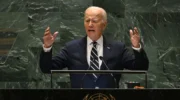With North Korea outgunning Nato, the defence secretary’s excuses for delaying his military strategy are paper thin.
Sometimes, a few key facts can illuminate a whole story. Like these: to date, the US has sent Ukraine about three million rounds of 155mm shells — the main workhorse ammunition being fired across battle lines. Europe has nearly reached its target, originally meant to be hit in spring, to deliver one million rounds.
On the other side, feeding the Russian war machine, North Korea is estimated to have delivered more than eight million rounds of roughly equivalent ammunition. That’s right, North Korea, the famine-prone, slave-economy, dictator-worshipping hermit kingdom, has literally outgunned the entire productive capacity of Nato.
All right, so its shells are no doubt the result of many years’ stockpiling and I’m sure a lot of them don’t work very well and they’re not exactly high-tech. But results on the battlefield speak for themselves. Ukraine is on the defensive, losing territory and rationing ammunition in the face of now-plentifully supplied Russian howitzers. Russian staying power has turned the tide.
All that’s going to be solved though, because the defence secretary, John Healey, is “publishing a framework for a new mission-driven defence-industrial strategy”, he told the London Defence Conference on Monday. This “sets out, at this point, guiding principles for a new strategy, which we will now develop in wide consultation” and “look to publish… in the spring”, so that Britain can then “set out the path to increasing spending”. This will show, he claimed, that Britain is “innovating at a wartime pace”. Take that, Putin!
What an utterly preposterous country we pretend to be. No wonder Donald Trump thinks the Ukraine war is a waste of time. Even mighty American stockpiles of ammunition are dwindling and Europe is rudderless. The German government has fallen, after passing measures to halve its Ukrainian military aid next year. France’s has gone the same way, felled by a debt crisis. Europe’s pro-Russian parties are in the ascendant. And Britain’s masterplan is to bury Moscow in consultation documents.
Still, despite Trump’s promise to wrap this whole thing up pronto, he will in practice find it impossible to forge a lasting peace. Zelensky may be making more conciliatory sounds, as Ukraine’s war effort and domestic support wobble. Yet there simply will not be enough on the table to tie up the war for Putin. Trump will struggle even to deliver limited concessions to Moscow, such as an end to sanctions, which would have to be authorised by Congress; or an unfreezing of Russia’s vast foreign exchange assets, which would need G7 and EU agreement.
Even if Trump could conduct a giveaway, Putin’s war aims go far deeper than his transactional cheerleaders in DC will admit. He set out to conquer Ukraine in order to alter the demographics of Russia by absorbing 40 million white Christians; to punish Ukrainian Orthodox schismatics and reclaim Kyiv, the birthplace of Russian Orthodoxy; to re-establish a Russian sphere of influence in eastern Europe; and to put an end to a US-dominated world order.
As the Eurasia expert and author of Economic War, Maximilian Hess, has pointed out, the whole of Russia is now geared up for many years of warfare, not quick wins. Defence will suck up a third of the planned 2025 budget, or 6 per cent of GDP. Military commanders have been replacing lickspittle politicians in key governorships. And second-tier industrial cities such as Izhevsk, home of the Kalashnikov, that had lain rusting since the 1990s have sprung back to life, churning out drones and missiles. Putin will no doubt string Trump along, hoping to starve Ukraine of weapons to gain further advantage, but there is no route to a grand bargain that the US (or Europe) could ever accept.
The long and short of it is that Europe is in this for the long haul, whether we like it or not, and needs to get serious. Yes, we have our problems. We are running out of money. Energy costs are appallingly high, especially for industry. But the cheapest way to defend our security in the long run is still to prevent the fall of Ukraine.
So Healey is right about the need for a military-industrial strategy, but he needs to start making it a reality now, not “in the spring” or “at a later date” or “in due course”. If the UK and its European allies are going to get industrial production up to the levels required, they urgently need to abandon their established way of doing things. Money is too tight and time is too short. The Ministry of Defence’s mega-procurement problems are well known, thanks to disasters such as the Ajax vehicle system, but the inertia runs all the way down to small projects too.
Take Project Oberon, a super-high resolution satellite project on which the MoD has spent years dillydallying. Five years in, it still hasn’t signed a contract to move from development to building, despite the technology being relatively cheap, probably superior to rival options and developed by British scientists with an all-British supply chain (including a University of Surrey spin-out and Oxford Space Systems, a company backed by the government’s own seed capital) and European ownership (Airbus).
Apparently it doesn’t even occur to the department to fast-track a project because it builds up valuable British capacity. The mandarins seem to think the slower a procurement process is, the better it must be. In the meantime, investors face pressure to allocate money elsewhere. If Healey really means to change things he could make this sort of procurement decision now, before more months and years have drifted by.
When governments do shake things up, they can achieve huge progress with less financial risk. At the London Defence Conference, the boss of Palantir in Europe described how the Pentagon had adopted a completely new procurement model for Project Maven, a successful scheme to develop algorithms interpreting drone data. Instead of signing a blockbuster, make-or-break contract, it put coders on a retainer so they could work out problems iteratively. This did not require months of reviews and consultations but for someone to sit down and think logically about what needed to be done and be given the authority to do it.
The excuses for inaction are wearing thin. Whatever the politics, whatever the budget constraints, it is inconceivable that Europe cannot mobilise its resources sufficiently to outdo North Korea. Failure, if it comes, will not be an inevitability. It will be a choice.









